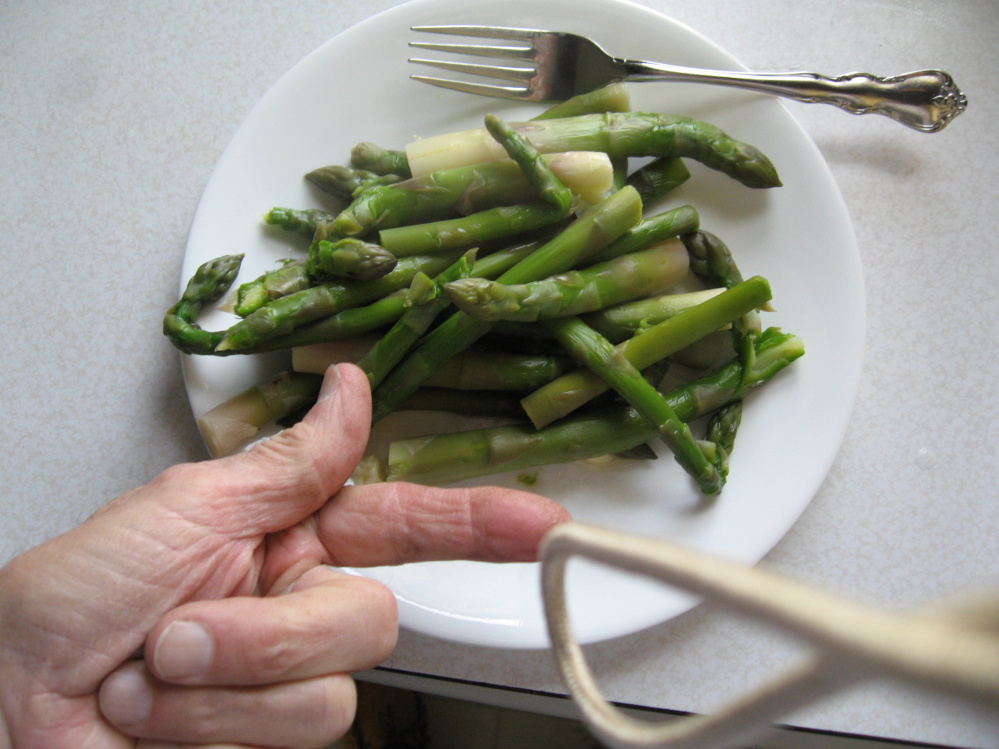A firestorm of indignation broke out when I mentioned on Facebook that my wife, Marsha, boiled my asparagus for 15 minutes. You’d have thought I’d gone to Augusta and suggested a hike in the minimum wage.
In an area where quiche now infests traditional Grange Hall suppers, I was not surprised to be told by many of my younger friends that they eat their veggies “blanched,” or practically raw.
Our city friends who never pulled a carrot from the ground were probably raised on mushy canned vegetables and may be compared with the folks who think that reality is the shadows they see on the cave wall. When they break their bonds, can they be blamed for wanting a vegetable that offers up a bit of resistance, or at least some indication that it was once alive?
Because I can’t cook, unless you count spaghetti and rolled oats, I maintained on Facebook that cooking is an art that cannot be learned. Some respondents said that cooking is a science.
Perhaps you have an opinion. Is cooking an art or a science? It is a ready-made topic for discussion. Living on the coast of Maine as we do, however, you know that trotting out a preliminary anecdote to shore up the matter at hand is mandatory.
One lazy summer afternoon in 1965 I married a wonderful young woman at the Chebeague Island Inn. That was one of my more memorable weddings, and I seem to recall that Tommy Bucci played piano, I played bass and my wife’s father danced with the new bride. By the time I was 29 I had played for so many dances and private parties that standing on the bandstand, even at my own wedding, seemed like the natural thing to do.
Later in the day I noticed my philosophy professor, Jim Whitten from Gorham, conversing with my wife’s philosophy professor, Doug McGee from Vassar. I approached and asked if they were having a profitable chat.
Mr. Whitten said, “Oh, no. So far we have only been defining our terms.”
Before inaugurating a discussion on any topic, one should start by defining the terms and parameters to be permitted or anticipated.
How do you define “done,” however, when you read, “Stick your fork in the asparagus to see if they are done”? What is “done” to one is raw or overcooked to another.
Facebook friend Claire says, “If one can read, one can cook.”
Is this true? If you’ve ever tried to follow written directions to complete some simple task on your computer, you might have noticed that a couple of crucial steps are usually left out. Like his colleagues who write cookbooks, the computer guru writing the computer instructions thinks that you don’t need to be told to hold down Ctrl with your little finger as you hit F8.
When I’d ask my old neighbor Gladys in the trailer next door how long to cook mackerel, she’d say, “Until they’re done.”
“How do you know when they’re done?”
“You can tell.”
So – “Poke muffin with finger to see if it is done.” If this is the first time you’ve ever opened an oven door, you could poke the muffin all day and only learn that your finger blisters easily.
Or “Seed and dice a green pepper.” How does one seed and dice a green pepper? My brother says that when he was 12 I taught him how to drive a car. He says I’d scream, “Push on the clutch.” He says that didn’t help him much because he didn’t know what the clutch was or how to find it.
If cooking were a science, anyone who could read could cook. I can read. I can’t cook. Therefore, cooking is an art.
Facebook friend Duane disagrees. He says, “I am a very good cook. I am an engineer. Cooking is engineering. Engineering is all about taking things that exist and combining them to make something useful. Cooking is all about taking edible things that exist and combining them to make something delicious and edible. Cooking is engineering, and engineering is not correlated with artistic talent.”
I’ll bet that if I followed the same recipe as Duane, I’d fail. And then someone would gently say, “Everybody knows that you can’t cook a 300-pound pig on a turkey spit.”
Anyway, after enduring two days of ridicule on Facebook for eating overcooked food, I asked Marsha how long she boiled asparagus.
She said, “Oh, from three to five minutes. Any longer than that and it gets mushy.”
The humble Farmer can be seen on Community Television in and near Portland and visited at his website:
www.thehumblefarmer.com/MainePrivateRadio.html
Send questions/comments to the editors.


